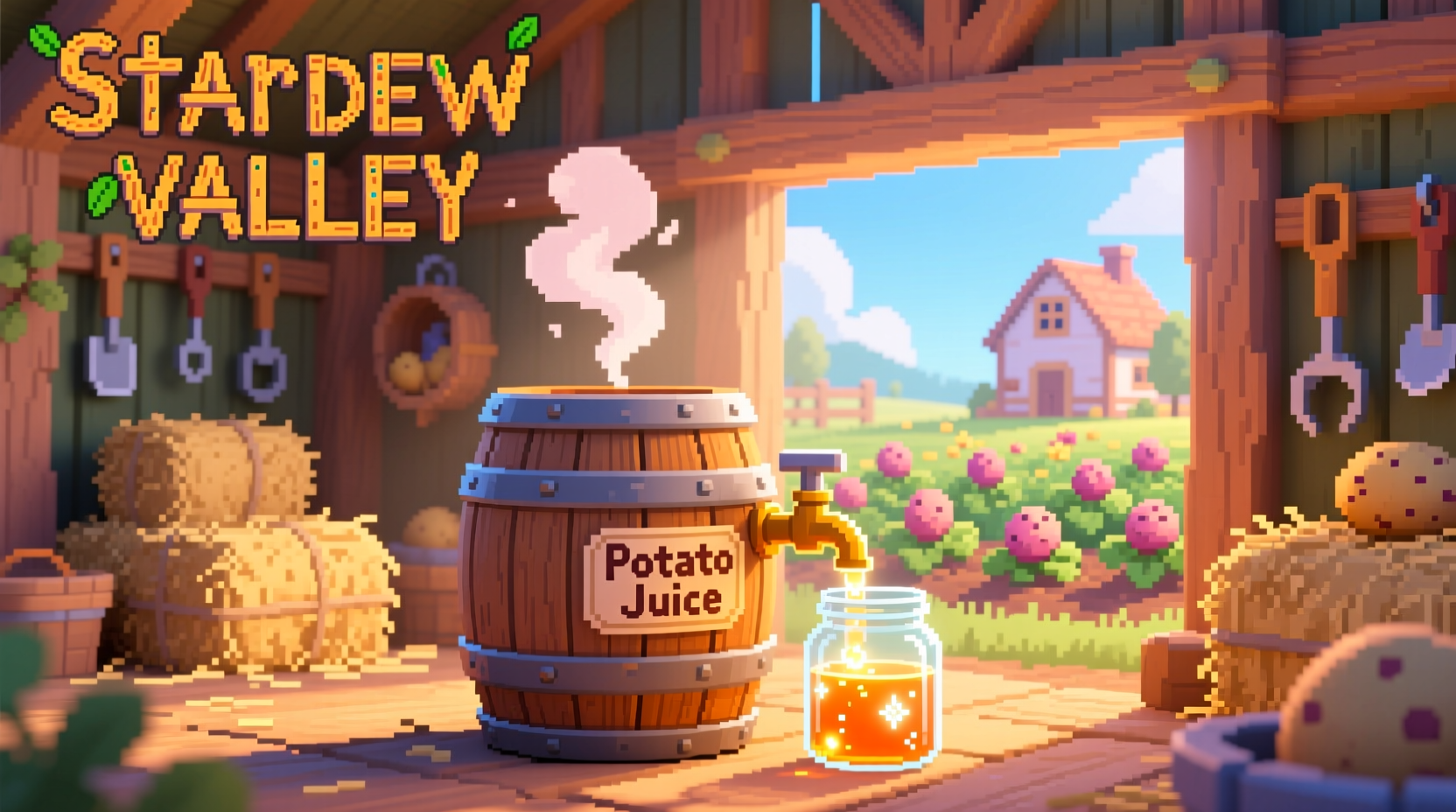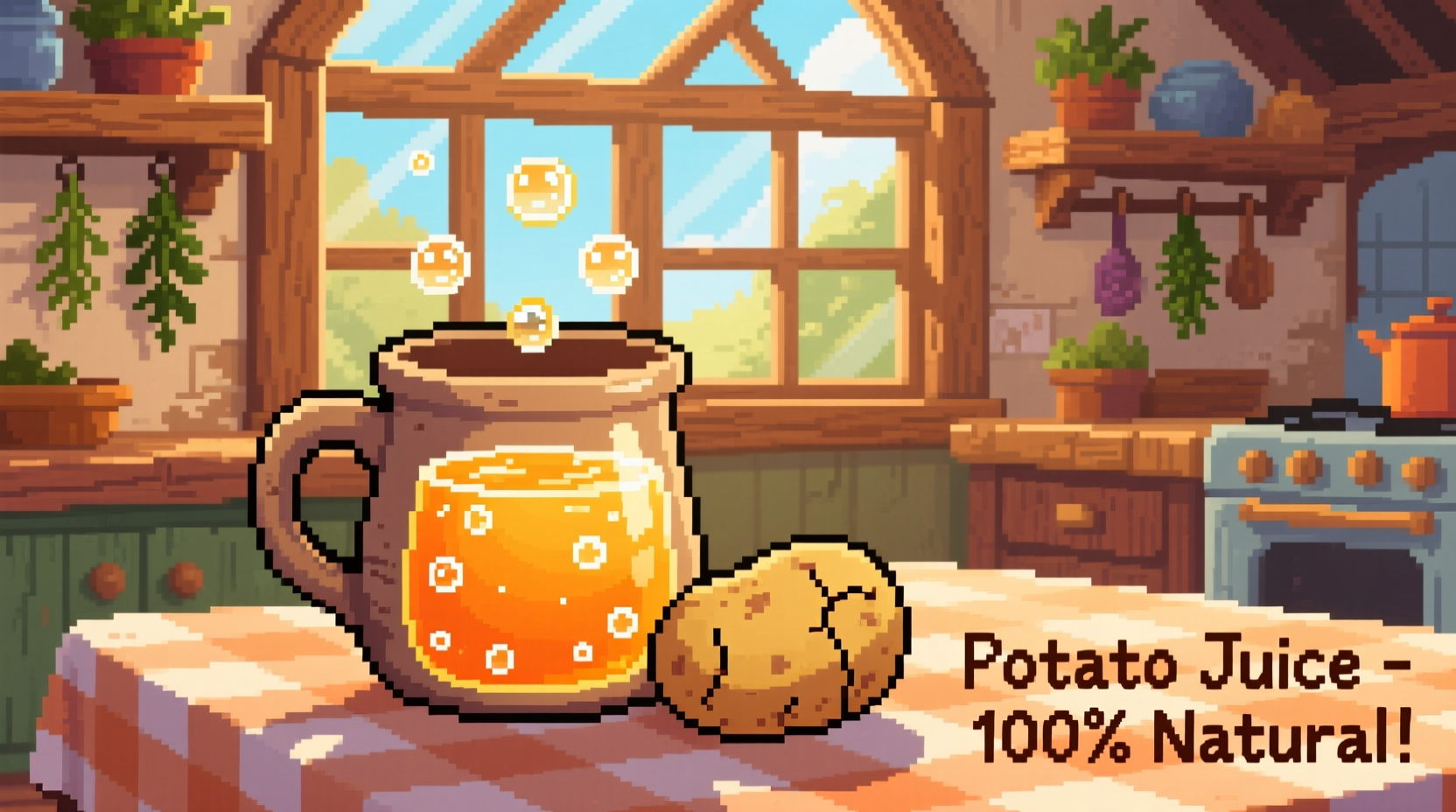Mastering Potato Juice Production in Stardew Valley
As a staple crop available early in Spring, potatoes offer one of your first opportunities to dive into artisan goods production. Unlike basic crops, potato juice transforms a common vegetable into a valuable resource that supports both your energy needs and farm economy.What You Need to Craft Potato Juice
To begin making potato juice, you'll need these essential components:
- Potatoes - Grown from potato seeds (100g each) during Spring season
- Oak Resin - Collected from mature oak trees (2-3 pieces per tapping)
- Keg - Crafted at the Carpenter's Shop (requires 1 copper bar, 1 oak plank, 1 stone)
| Ingredient | Source | Quantity Needed |
|---|---|---|
| Potato | Farming (Spring) | 1 per juice |
| Oak Resin | Tapping oak trees | 1 per juice |
| Keg | Carpenter's Shop | 1 (reusable) |
The Complete Processing Timeline
Understanding the time investment is crucial for effective farm planning. Here's the complete timeline from planting to finished product:
- Days 1-14: Plant potatoes (day 1), harvest after 6 days, then replant for continuous production
- Day 7: First potato harvest ready
- Day 7+: Collect oak resin from mature trees (requires 27-day growth cycle)
- Day 7+1: Place potato + oak resin in keg
- Days 8-14: Processing period (7 days minimum)
- Day 15: Potato juice ready for collection

Practical Benefits and Strategic Uses
Potato juice delivers multiple advantages that make it worth incorporating into your farming strategy:
Immediate Character Benefits
- Restores 130 energy points (ideal for mining or resource gathering)
- Recovers 160 health points (valuable during dangerous cave exploration)
- Provides +0.5 farming skill experience per consumption
- Offers moderate stamina regeneration during consumption
Economic Value Analysis
When evaluating whether potato juice is worth producing, consider these financial aspects:
- Base selling price: 160g per bottle
- Artisan profession bonus: 40% increased value (224g)
- Quality bonus: Silver star (20% more) = 192g, Gold star (40% more) = 224g
- Compared to raw potatoes (50g), the value increase is substantial
Strategic Implementation Guide
Maximize your potato juice production with these proven techniques:
Optimal Farm Layout
Design your farm for efficient potato cultivation:
- Dedicate at least 20-30 tiles to potatoes for consistent production
- Place kegs near your crop fields to minimize travel time
- Position oak trees strategically around your farm for easy resin collection
- Use quality sprinklers to reduce manual watering requirements
Seasonal Production Planning
Since potatoes are a Spring crop, plan your production cycle carefully:
- Start processing immediately after first harvest (day 7)
- Continue planting every 6 days for continuous supply
- Store excess potatoes in chest for off-season production
- Consider greenhouse production for year-round availability
When Potato Juice Shines: Contextual Applications
Understanding the specific scenarios where potato juice provides maximum value helps optimize your resource allocation:
- Early game: One of your first artisan products, providing crucial early-game income
- Mining expeditions: Superior to basic crops for energy restoration during deep mining
- Skill building: Efficient farming experience gain while restoring energy
- Community Center bundles: Not directly required, but supports overall farm viability
- Before rainy days: Stock up when you can't farm to maintain energy for other activities
Comparative Analysis: Potato Juice vs. Alternative Drinks
How does potato juice stack up against other artisan beverages?
| Drink | Energy Restored | Health Restored | Processing Time | Base Value |
|---|---|---|---|---|
| Potato Juice | 130 | 160 | 7 days | 160g |
| Beer | 255 | 0 | 7 days | 225g |
| Mead | 255 | 0 | 14 days | 300g |
| Green Tea | 0 | 240 | Instant | 120g |
While beer and mead offer higher energy restoration and value, potato juice provides the unique combination of both energy and health recovery, making it particularly valuable during dangerous activities like mining or combat.
Advanced Optimization Strategies
Take your potato juice production to the next level with these expert techniques:
- Quality focus: Use fertilizer to increase chances of silver/gold quality potatoes
- Batch processing: Fill multiple kegs simultaneously for consistent output
- Season extension: Grow potatoes in the greenhouse for year-round production
- Profession selection: Artisan profession increases value by 40%, making it highly recommended
- Storage management: Use quality chests to preserve keg output quality
Common Player Misconceptions
Several myths persist in the Stardew Valley community about potato juice:
- Myth: Potato juice isn't worth making compared to other crops Reality: Its dual energy/health restoration makes it uniquely valuable for specific activities
- Myth: The processing time is too long for early game Reality: At 7 days, it's among the fastest artisan products to produce
- Myth: Only useful for farming skill gain Reality: Its primary value is in character restoration during resource-intensive activities
Integrating Potato Juice into Your Farm Economy
For players serious about maximizing their farm's potential, potato juice should be part of a diversified production strategy:
- Combine with other early-game crops like strawberries for balanced income
- Use during Spring when other crops aren't yet available
- Stockpile for rainy days when farming isn't possible
- Consume before challenging activities rather than selling for immediate benefits
- Consider it a stepping stone to more advanced artisan products as your farm develops
Frequently Asked Questions
How long does it take to make potato juice in Stardew Valley?
Potato juice requires exactly 7 days to process in a keg. This processing time begins once you place both a potato and oak resin into the keg. Unlike some other artisan goods, the quality of the potato doesn't affect processing time.
Does potato juice provide any special benefits beyond energy and health restoration?
Yes, consuming potato juice grants +0.5 farming skill experience points in addition to restoring 130 energy and 160 health. This makes it particularly valuable for players focusing on leveling up their farming skill while maintaining energy for other activities.
Is potato juice worth making with the Artisan profession?
Absolutely. With the Artisan profession, potato juice sells for 224g instead of the base 160g, representing a 40% increase in value. Given its relatively short processing time and the early availability of potatoes, it's one of the most accessible and profitable artisan goods during the first year of gameplay.
Can I make potato juice without oak resin in Stardew Valley?
No, oak resin is a required ingredient for making potato juice. Each bottle needs exactly one potato and one oak resin placed in a keg. You can collect oak resin by tapping mature oak trees with an axe, which yields 2-3 pieces of resin per tree. Resin regenerates every 7 days, making it a renewable resource.
How does potato juice compare to other early-game artisan products?
Potato juice stands out among early-game artisan products because it's one of the first available (starting in Spring) and provides both energy and health restoration. While beer offers more energy, it requires wheat which isn't available until Summer. Potato juice's dual restoration capability makes it uniquely valuable for mining expeditions and other dangerous activities where both energy and health matter.











 浙公网安备
33010002000092号
浙公网安备
33010002000092号 浙B2-20120091-4
浙B2-20120091-4